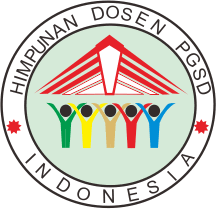Hubungan antara konsep diri dengan kemampuan berpikir tingkat tinggi sebagai transfer of knowledge materi pecahan pada peserta didik kelas V sekolah dasar
Abstract
The purpose of this research is to find out the relation between the self-concept and ability of high-level thinking as a transfer of knowledge of rational number material. This research was conducted at the student in V grade of Elementary School in 2019/2010 academic year on Ngurah Rai cluster at Laweyan District, Surakarta City. This research used correlation quantitative research methods. The sampling technique used was a random sampling of the student population in the V grade of Elementary School on the Ngurah Rai cluster. The retrieval data of the study used questionnaires and tests. The analysis data technique used simple regression analysis. Referring to the results of the statistical analysis, the correlation coefficient r was 0.761 with a regression model Ŷ = 55.99 + 2.1Xwith a contribution of 57.91%. Indicating to those results, there was a positive relation and significance between self-concept with the ability of high-level thinking as a transfer of knowledge of rational number material. The results of this study are expected to add scientific insights and can be used as relevance for similar research. Elementary V grade students are also expected to be able to develop positive self-concepts so that students high-level thinking abilities can increase.
Keywords
Full Text:
PDFReferences
D Arisandi, Kuswadi, Usada, and S Kamsiyati 2016 Peningkatan Kemampuan Operasi Hitung Perkalian dengan Metode Kumon pada Pembelajaran Matematika J Didaktia Dwija Indria 4(5) 1–5 [2] J S Nugroho, H Mahfud, and Karsono 2017 Penerapan Model Means Ends Analysis (Mea) untuk Meningkatkan Kemampuan Menyelesaikan Soal Cerita Mata Pelajaran Matematika pada Siswa Sekolah Dasar J Didaktia Dwija Indria 5(4) [3] H N Dinni 2018 HOTS ( High Order Thinking Skills ) dan Kaitannya dengan Kemampuan Literasi Matematika 1 170–176 [4] Nugroho R Arifin 2019 HOTS (High Order Thinking Skills) (Jakarta: Gramedia Widiasarana Indonesia) [5] Husamah, Y Pantiwati, A Restian, and P Sumarsono 2018 Belajar dan Pembelajaran (Malang: UMM Press) [6] I W Widana 2017 Penyusunan Soal Higher Order Thinking Skill (HOTS) (Jakarta: Direktorat Pembinaan SMA) [7] K A Purbaningrum 2017 Kemampuan Berpikir Tingkat Tinggi Siswa SMP dalam Pemecahan Masalah Matematika Ditinjau dari Gaya Belajar 10(2) 40–49 [8] A Indriani 2013 Pengaruh Motivasi Belajar Siswa Kelas V Terhadap Prestasi Belajar Matematika di SD Negeri Bejirejo Kecamatan Kunduran Kabupaten Blora 4(2) 134–140 [9] Leonard and Supardi 2014 Pengaruh Konsep Diri, Sikap Siswa pada Matematika dan Kecemasan Siswa terhadap Hasil Belajar Matematika 29(3) 341–352 [10] D Nugraheni, Usada, and S Kamsiyati 2013 Penggunaan Media Kartu Pecahan untuk Meningkatkan Hasil Belajar Matematika Konsep Pecahan J Didaktia Dwija Indria 2(4) [11] Subaryana 2015 Konsep Diri dan Prestasi Belajar 7(2) 21–30 [12] M Rosra and Yusmansyah 2012 Hubungan antara Konsep Diri dalam Belajar dan Motivasi Belajar dengan Prestasi Akademik Mahasiswa [13] T A Bharathi and P Sreedevi 2018 A Study on the Self-Concept of Adolescents 512–516 [14] K Cherry 2019 What Is Self-Concept ? 8–11 [15] Desmita 2012 Psikologi Perkembangan Peserta Didik (Panduan bagi Orang Tua dan Guru dalam Memahami Psikologi Anak Usia SD SMP dan SMA) (Bandung: Remaja Rosdakarya) [16] Desmita 2013 Psikologi Perkembangan (Bandung: Remaja Rosdakarya) [17] A N Masturah 2017 Gambaran Konsep Diri Mahasiswa Ditinjau dari Perspektif Budaya (2)2 128–136 [18] Risnawati 2013 Keterampilan Belajar Matematika (Yogyakarta: Aswaja Pressindo) [19] Solikhin, M I R Luawo, and Djunaedi 2016 Konsep Diri Akademik Peserta Didik Jenjang Menengah Pertama Berdasarkan Jenis Kelamin (Studi Survei di Lembaga Bimbingan Belajar Primagama Kampung Makasar) Bimbing. Konseling 5(1) 100–107 [20] J Hattie 2014 Self Concept (New York: Psychology Press) [21] T Pamungkas and D R Sari 2015 Hubungan antara Konsep Diri dengan Hasil Belajar Matematika Siswa Kelas VIII SMP Negeri 34 Batam Tahun 2014 4(1) 56–62 [22] Burns 1993 Konsep Diri, Teori Pengukuran, Perkembangan dan Perilaku (Jakarta: Arcan) [23] A I Setiawan and M Waspodo 2015 Hubungan Antara Gaya Belajar dan Konsep Diri dengan Hasil Belajar Matematika Studi Korelasional pada Siswa Kelas VI SDN Mulyasari Kecamatan Gunungsindur Kabupaten Bogor) 4(2) 30–42
Refbacks
- There are currently no refbacks.



